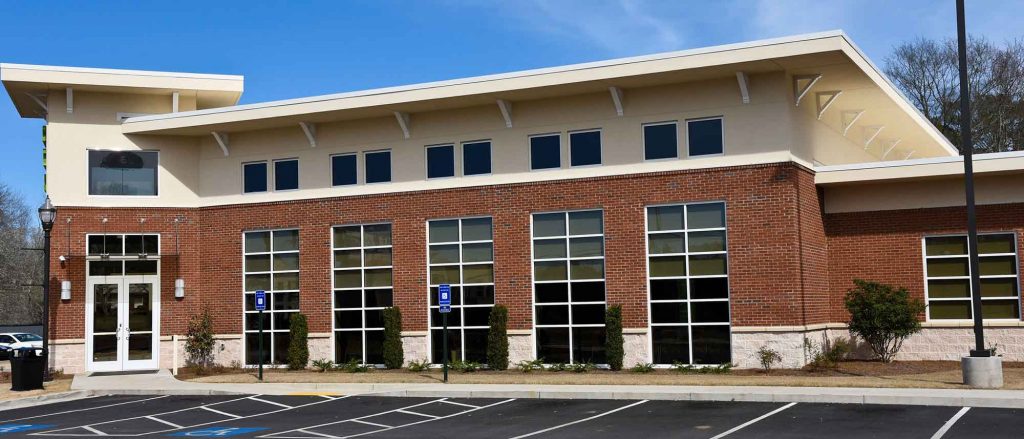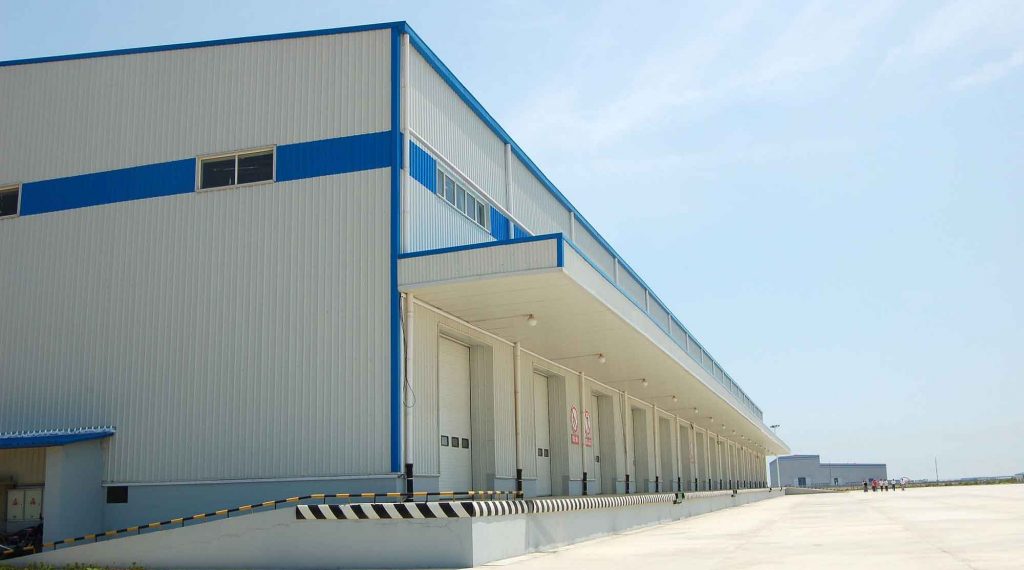SBA real estate loans are available via the 7a or the 504 program for most types of buildings and property that are primarily occupied by a borrower’s business.
The SBA 7a allows 100% financing for a commercial property and the 504 is typically limited to 90%.

The types of real estate that small business administration loans can be used to finance include everything from generic buildings that house almost any type of business to mixed-use buildings with residential tenants to RV Parks, campgrounds, marinas and many types of property in between.
The primary key for eligibility is that the business real estate must have some type of commerical zoning (or in some cases rural zoning), must be used by your business…and your business and/or it’s employees must legitimately occupy at least 51% of the real estate (or 60% if building from the ground up).
SBA Real Estate Loan to Buy Property
Most lenders will finance a variety of business property loan types and while there are rules that all must adhere to, there are guidelines that are interpreted differently depending on the lender, including:
- Down Payment – not all lenders require one
- Credit Quality– most lenders have a minimum credit score but not all and some will lend to borrowers with a prior bankruptcy
- Cash Flow/Debt Service Coverage – many lenders do NOT require 2 full years of solid cash flow or historical debt service coverage of 1.25 and some will work off of projections.
- Property Type/Type of Business – SBA real estate loans are made by lenders with a guaranty (basically an insurance policy) from the Small Business Administration. Individual lenders decide what type of real estate they will finance.
SBA Real Estate Loan Down Payment Requirements
SBA real estate lending guidelines have lots of fine print and caveats and most lenders will tell you that you must put down at least 10% to purchase a property using either the 7a or the 504, however this is NOT true in the case of the 7a as there are 7a lenders that will approve loans with no down payment.
It is true that a business needs a down payment in the case of the 504, but some lenders are okay with the business borrowing the down payment on a 504.
Borrowing Down Payment
504 loans require a down payment of 10% when purchasing business property, however there is some flexibility with where the down payment can come from as some lenders allow a business (or business owner) to borrow the down payment (from another lender) as long as the business can cash flow the additional payment on the borrowed money.
The SBA 504 lender will want to make sure the payment terms of the borrowed down payment will not put undue strain on the business and lenders are typically concerned about a business’s post-closing liquidity so borrowing the down payment on a 504 is very “case by case” but possible.
FYI: You can also use a gift, have “investors” that contribute cash in return for a percentage of ownership, utilize some seller financing, or in some cases roll over a retirement account.
Each scenario (and each lender) has slightly different rules and ultimately a loan has to have enough strengths to be approved and each borrower/business needs to have enough of their own cash in the deal but the point is there are options other than cash-on-hand for the down payment with the 504.
100% SBA Real Estate Loans
Perhaps the most remarkable feature of the 7a program is that a business can actually borrow up to and over 100% of a property’s purchase price, construction costs (including the cost of land) or, in the case of a refinance or renovation/rehab, the appraised value.
100% business real estate loans are only offered by a few SBA 7a lenders and the terms are favorable.
If your business needs one of these high loan to value commercial mortgages you can visit our 100% financing page here for a detailed overview of the program.
25 Year Fixed Rate Business Property Loans
SBA business property loans may also be the only way to get a true long term fixed rate with no balloon or rate adjustment on commercial property and there are a few lenders who actually offer 25 year fixed rate loans.
This is not something typically seen with conventional lenders as most regular bank loans not only require at least 20% down, but are generally fixed for only 5, 7 or 10 years at a time with a 20 or 25 year amortization. (Even most SBA business real estate lenders prefer to offer a floating rate or a 5 year fixed rate).
The lenders who offer 25 year fixed rate loans are typically a little more conservative – meaning they might only lend to the best borrowers but there are many, many businesses that can qualify and the SBA Gauranty gives the lender the ability to be more flexible with underwriting than they can be with a conventional loan.
A 25 year fixed rate small business property loan has a few significant advantages over a conventional loan – primarily the fact that you may never need to refinance again or go through the hassle of re-qualifying for a loan or pay the costs associated with doing so. And while the fees for a small business real estate loan might be higher, the trade off is you likely will not have to pay any additional fees in the future associated with a refinance since the loan is locked for 25 years at a low rate.
SBA Loan for Rental Property (Sort of)
7a and 504 loans are technically NOT for real estate investment, however, it depends on how you define “investment.”
You can use the 7a or the 504 for rental property for the following types of “business” real estate as long as you, your employees (or in some situations) an eligible 3rd party management company operates the business:
- Self-storage or mini-storage – SBA self storage loans are an exceptional value as most transactions require just 10% down and in the case of new construction the first few years of payments can be financed into the mortgage.
- RV and Boat Storage – the same guidelines apply for RV and Boat Storage as for mini or self-storage including the fact that the down payment can be borrowed.
- RV Parks, Marinas, Hotels, Campgrounds – with the exception of RV Parks these are less like rental properties and more like true business properties and can be eligible if at least 51% of the revenues are coming from “short term stays” (guests staying for 30 days or less).
Owner Occupied vs. Tenants
A borrower’s business will typically occupy 100% of the square footage for many business real estate loan transactions, but it is acceptable to have up to 49% of a property occupied by tenants (either residential or commercial) if you are financing an existing building or up to 40% if you are financing new construction. In most cases however, the business must have sufficient cash flow to fully support the mortgage payments.
100% Loan with Mortgage Paid By Tenants
These loans allow tenants to occupy part of the property and this is can be done in combination with 100% financing with a 7a loan.
We have had numerous clients that have purchased a building where they were renting 51% or more of the space and were able to purchase the building with no down payment and have the rents from tenants completely cover the mortgage payment – or at least a sizeable portion of the payment.
Please note that SBA 7a loan requirements dictate that your business still needs to be able to afford the mortgage payment on it’s own, but having your tenants cover the cost of the mortgage is a fairly ideal situation.
The 7a also allows 100% commercial construction loans where some lenders will let you build out some very basic space for tenants (usually to drywall) as long as all of the square footage is under one roof.
This is possible because the SBA real estate loan guidelines specify that your business must occupy 60% or more of newly constructed space and the rest can be occupied by tenants. The guidelines state that your business “must initially occupy 60% of property, may lease to a 3rd party up to 20% and (temporarily) lease an additional 20% with the intention of using some of
the additional 20% within 3 years and all of it within 10 years.”
Loans for Mid-Sized Businesses
SBA real estate loan options from the Small Business Administration are not just for small businesses.

The 504 program in particular can technically accomodate fairly large commercial real estate loans in the $15 to $20 million range which makes them a good choice for mid-sized businesses of all types who are looking for higher leverage than they can get with a conventional business mortgage loan.
The benefit to using the 504 program is the fact that you can get long term fixed rate financing with between 10% and 20% down vs. a “conventional bank loan” which would normally be 20% or more down with a shorter fixed period and a shorter amortization than what is available with an SBA business real estate loan.
The 504 loan program has a 2 loan structure with a traditional/conventional/bank loan in first position and a 100% guaranteed fully fixed 20 or 25 year fixed rate second mortgage. Some lenders offer 25 year fixed rates on the first mortgage which makes fully fixed 25 year fixed rate financing available with a low down payment and a low rate.
Larger loans are usually frequently used by the following types of businesses:
- Industrial Properties
- Manufacturing Businesses
- Self Storage Facilities
- Hotels
- Assisted Living Facilities
Please contact us or call us at 1-800-414-5285 if you have any questions about qualifying for a small business property loan for either a small or mid-sized business.